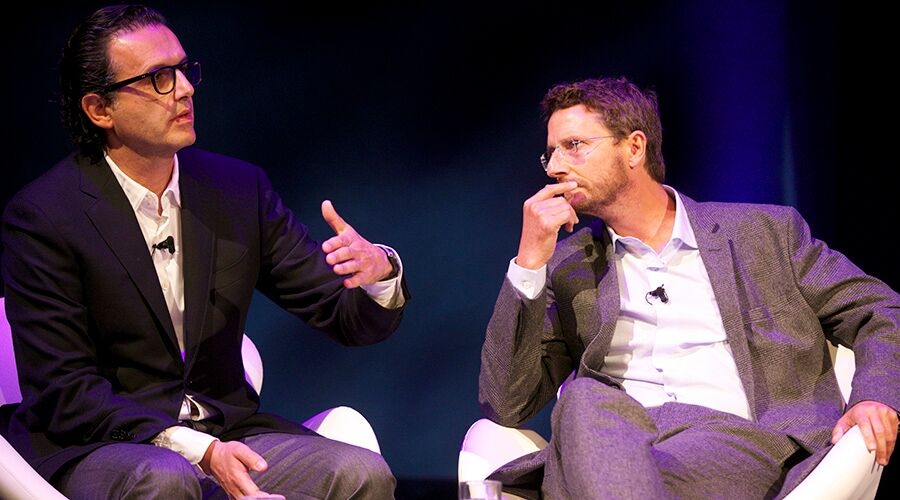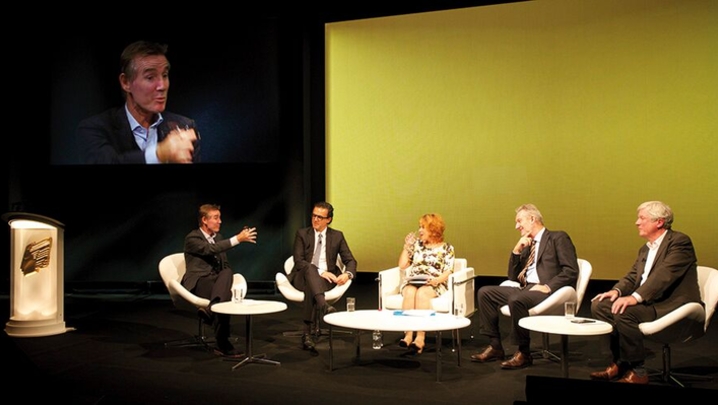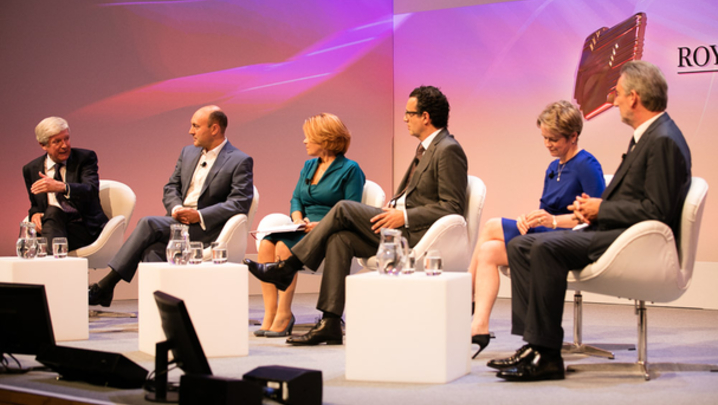Cambridge Convention 2015 Session Four: Is US ownership of UK producers good for the British TV sector or will it undermine risk-taking?
There is little agreement about whether increasing US ownership of Britain’s independent sector threatens or sustains home-grown production and the UK’s unique creative culture.
A feisty session at the Convention, “Working for the yankee dollar? Consolidation and creativity”, offered conflicting views, not only on foreign ownership but also on the surprise review into the terms of trade announced by minister John Whittingdale the day before.
A year earlier, Channel 4 CEO David Abraham had warned in his MacTaggart lecture that UK indies were being “snapped up almost wholesale and acquired by global networks and sold by private equity investors at a faster rate than tickets to a public flogging of Jeremy Clarkson”.
In his controversial speech, Abraham had called on regulators to “update and strengthen” the UK’s public service broadcasting system, which he argued had “created the best conditions for creative programme-making on the planet”.
Chair Lorraine Heggessey kicked off the Cambridge session by asking Abraham whether his concerns over US ownership of UK production companies had “grown or decreased” since he spoke in Edinburgh. She claimed that “65% of the top, most profitable indies” were now foreign-owned.
We’re in denial if we pretend that, creatively, nothing will change
“[My concerns] have not decreased,” replied the C4 chief. “We have continuing acquisition and vertical integration of companies.”
He continued: “We have a different culture. We have all worked in America and we all know that there is outstanding creativity there, but we do things differently here. The risk-taking appetite that’s built into the not-for-profit public-service system is fuelled by our creative economy.”
Abraham argued that many of the US media giants, which had been hoovering up UK indies, were “saddled with a lot of debt. They have seen their share price come under a lot of pressure”. He added: “I know that, at the top of these companies, financial realities will come to bear. We’re in denial if we pretend that, creatively, nothing will change.”
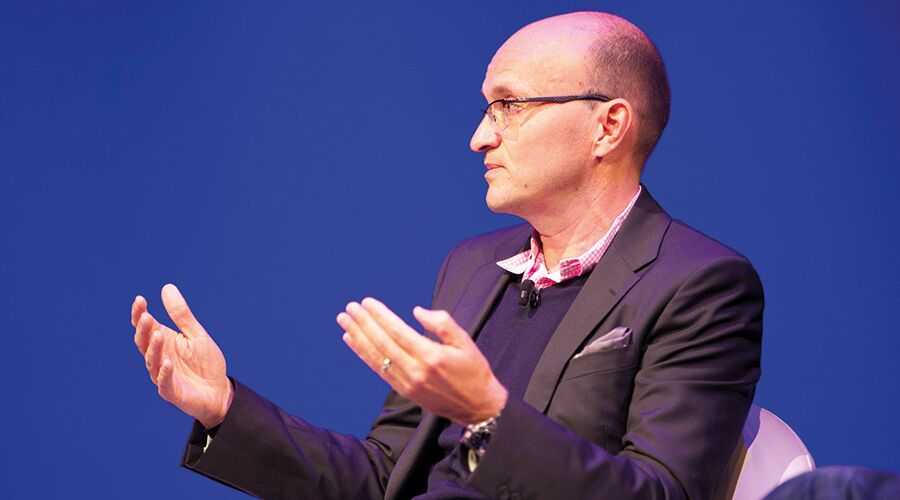
“We are, through and through, a British company,” responded Tim Hincks, President of Endemol Shine Group, which was formed by the merger last year of the two production companies, 21st Century Fox-owned Shine and Endemol, owned by private equity firm Apollo Global Management since 2012. “We create content for our local broadcasters. It’s a fantastic ecosystem that has been so helpful in encouraging creativity.”
Hincks added that the claim that “being owned by major American corporations is crushing creativity simply doesn’t seem to stack up. We’ve been owned by many foreign owners over the years and it’s made no difference to our ability to create original British content.
“It’s a success story and people are going to invest in British success stories.” Other past owners of Endemol have included the Spanish telecom giant, Telefónica.
Another member of the panel, Nick Southgate, had run Shed Media Group when the indie sold a controlling interest to Warner Bros in 2010.
He remained as CEO of the group until last year when Warners acquired 100% control of Shed and rebranded it Warner Bros Television Productions UK.
It’s about how you manage your owners, not whether you’ve a good or a bad one
Recalling the sale, Southgate told the Convention: “It was the right thing to do. We were a listed company following an ITV share price down the toilet and so we needed a home.”
He added: “We had a [clause] in the deal that we would operate autonomously for three years, and Warner Bros was incredibly supportive throughout that three-year period. I think the danger comes after that period, when the inevitable integration starts to happen.
“My warning [to US owners] is: leave the UK creative people to do what they do brilliantly. Don’t lose sight of why you bought us in the first place – because we operate in this brilliant ecosystem where quirky shows get commissioned, risk is taken, these funny little shows flourish and eventually find an international audience.”
Low-margin UK production in such a US group, Southgate said, could be dwarfed by very profitable American production and IP-generating businesses. “The danger is that some accountant somewhere is going to look at that UK business and ask why it is not making any money.”
“I think you could have exactly the same argument about an entirely UK-owned company,” responded Hincks. “It’s about good management of a creative business – I don’t think it’s a matter of foreign or domestic ownership. I have been owned by many different people and there are good owners and bad owners.”
Wayne Garvie, Chief Creative Officer for International Production at Sony Pictures Television, which owns, among others, British indie Left Bank Pictures, rejected the notion that US giants “want to buy British companies and transform them into American companies” as “nonsense”.
“In the real world that we live in,” added Garvie, “you’ve got to work with people who can take your IP around the world – you need to be part of a big, strong, muscular distribution company.”
Hincks agreed with Abraham that the UK broadcasting ecosystem strongly supports risk-taking: “I passionately believe that this system needs defending but, at the same time, we know that it is under pressure.” However, he continued, “the scale of the consolidated [companies helps] to foster the risk-taking of British creatives”. He went on: “Being protected can, in the right hands, allow you to take more creative risks.”
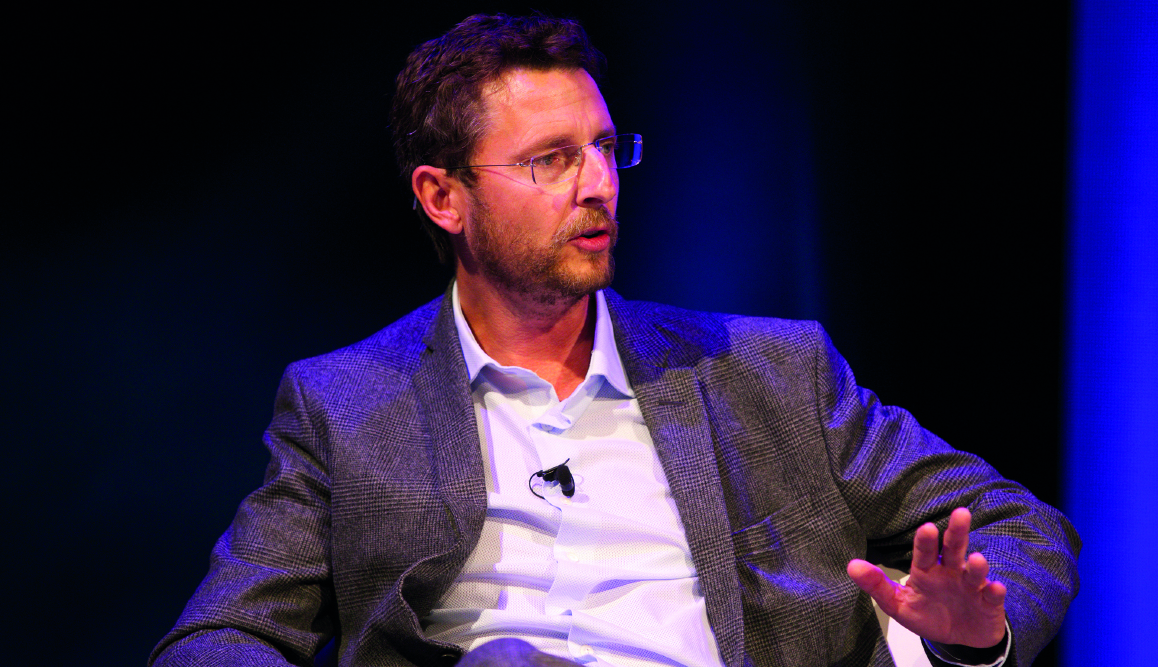
Channel 5, the smallest UK public service broadcaster, was snapped up by US media giant Viacom for £450m in 2014. Heggessey asked Abraham if he was worried that more US acquisitions would follow.
“The Secretary of State has made it very clear that there are no plans to privatise Channel 4 and, equally importantly, he said that he values the remit of Channel 4,” replied Abraham.
A week after the Convention session, however, photographic evidence of a Government document setting out options for just such a sell-off surfaced.
Admitting that he was moving into a world of “hypothesis”, Abraham asked: “What does the world look like if ITV [is sold], if there’s a different settlement for the BBC and Channel 4 [is privatised]? Then, you’re in a different country and we really do need to wake up to the consequences of all of those cards falling in that way.
“It’s pretty much what I said a year ago [in Edinburgh] and I still believe it. I’m incredibly proud of what this country is capable of doing and we should really work to preserve what it is that makes us special.
“But there’s an omertà around being really honest about how different we are to the culture of American corporations.”
Garvie, however, was nonplussed about a raid on UK broadcasters. “You might find that there isn’t any change for the viewers, which is the most important thing,” he said.
“Isn’t the most important thing the way that it’s regulated – the fact that we have a protected public-service sector?” asked Hincks.
“What I do share is your passionate belief in this ecosystem that we have and I’m not sure that’s necessarily at odds with ownership and, even if it is, I’m not sure what you do about that. We are now [part of] a global marketplace and these are the realities.”
The panellists were: David Abraham, CEO, Channel 4; Wayne Garvie, Chief Creative Officer, Sony Pictures Television; Tim Hincks, President, Endemol Shine Group; and Nick Southgate. The session was chaired by Lorraine Heggessey, Chair, Grierson Trust and Advisor, Channel 4 Growth Fund; it was produced by Alan Clements.
A transatlantic misunderstanding
Nick Southgate: ‘Before I left [Shed], I was a part of a regular development conference call where you pitched your latest shows. We had a BBC Three show and a new Channel 4 format, which we were very excited about.
‘We made the call to the new executive on the other end in Burbank… There was deathly silence and then, from across the Atlantic, came the words: “Nick, I don’t want anything with a four, a three or a two after it – I just want a one.”
‘That’s an absolutely true story and I think it goes right to the heart of what we’re talking about.’
Question & answer
Q John McVay, CEO, Pact: David… I’m a bit disappointed that… yet again, the two publicly owned broadcasters [the BBC and Channel 4] seem to be lobbying against the interests of small private businesses.… Would you give us an undertaking that… if Ofcom comes to a recommendation that the current [terms of trade] arrangements remain [appropriate], you won’t be lobbying for the next 10 years for any subsequent reviews or changes?
A David Abraham: It’s unhelpful to portray this debate as if we are secretly seeking to repeal the system and undermine the position of the small companies – it’s a misrepresentation of anything I or anyone has said.
I’m passionately committed, if anything, to improving the position of the smaller companies and the IP recognition that is at the heart of the terms of trade. It doesn’t mean that we should not look at reforming the system.
A Bal Samra, Commercial Director, BBC: It’s right that we think about the changing landscape… it ought not to be considered to be a loaded thought process to look at a particular part of the ecosystem. We should all be open-minded. It’s really important that the ecosystem of the UK does support new talent and companies.
A Nick Southgate: The BBC has already taken back everything that we gained from the terms of trade because you were under-funding our shows by at least 10%.
Q Steve Hewlett, writer and broadcaster: Given that nobody is able to dictate to the broadcasters who they buy from, [the system] is self-correcting. If the process of consolidation leads to creative ruin, then creativity emerges somewhere else.
The broadcasters have the whip hand, don’t they?… On the terms of trade, can someone scale the problem? At the bottom, everyone seems to accept that small indies deserve and need protection… Big indies at the top do not get protection under terms of trade…
How big is the problem in the middle?… What proportion of C4 shows, for example, are supplied by big, powerful indies that still benefit from the terms of trade?
A David Abraham: [You need] to look at this over time. [C4 and the BBC] are helping some of the companies to go from small to medium and then from medium to large, so you can’t take a snapshot.
But there was a bulge of companies in the middle who became quite big but were still qualifying [under the terms of trade], so there is a challenge in adjusting definitions of what is and is not qualifying…
As to the “whip hand” issue… [broadcasters] are not in such a powerful position as we were and therefore there should be a revisitable framework.
Q How does US ownership change indies?
A Ed Shedd, Partner, Deloitte: To say it’s about finance people from Burbank versus UK creativity is probably taking it a bit too far. I agree with Tim [Hincks] that it’s about how you manage your owners, not whether you have a good or a bad one.
Q Lorraine Heggessey, session chair: Tim, you have had lots of owners – have any of them made any difference?
A Tim Hincks: They have made a difference… There have been different flavours and colours but, the truth is, if you’re working for Endemol Shine in Holland, your world is Endemol Shine Holland… If you’re creating and making shows, your world is largely that domestic world unless your show travels.
What is at stake in Ofcom’s review of the terms of trade?
John Whittingdale’s announcement of a review of the terms of trade under which indies and public service broadcasters conduct their business surprised the TV execs gathered at Cambridge.
Session chair Lorraine Heggessey spoke for many when she said: ‘We all thought that the terms of trade, for the time being, had been put to bed.’ According to producers’ body Pact, this would be the fifth such review in a decade.
The Secretary of State for Culture, Media and Sport announced that he was asking Ofcom to ‘undertake a health check’ of the 2003 regulations, which are underpinned by three principles: promoting cultural diversity; opening up production to new voices; and stimulating the growth of small and medium enterprises.
Whittingdale noted that seven of the 12 biggest UK indies were now part of major global businesses, adding: ‘The time seems right to check whether the regulations remain the most effective means of supporting small independent producers in their negotiations with broadcasters in light of significant… changes in the relative size and strength of the different parties.’
Channel 4 CEO David Abraham welcomed the review. ‘We have called attention to the level of change that’s occurred in the industry and my fear is that, if we don’t have this debate now, then it might be that further changes in the industry over the next 10 years [mean] the implementation of the [2003] principles will become more and more problematic.’
‘The terms of trade allow creative people and organisations to have a fair share of what they create,’ argued Tim Hincks, President of Endemol Shine Group, who backed the current system. ‘We have a number of small and medium-sized indies, which are covered by the terms of trade, and bigger, non-qualifying indies, which are not covered. It’s a simple mechanism that seems to work very well.’
Hincks questioned whether there had been any change since the last review that justified yet another look at the terms of trade. He added: ‘What would be a real tragedy would be for this debate to be used as a smokescreen to hammer the [smaller and medium indies].’
Addressing Abraham, the Chief Creative Officer for International Production at Sony Pictures Television, Wayne Garvie, said: ‘I don’t understand why you want to disturb, yet again, something that is working so brilliantly well.’
‘It’s the difference between reform and repeal,’ replied Abraham. ‘The debate up until now has been as if we’re saying, “Let’s just scrap the whole thing”, and we’ve never said that.’
‘If you break something that’s worked so well, you do it at your peril,’ warned Nick Southgate, formerly CEO of Shed Media Group.

